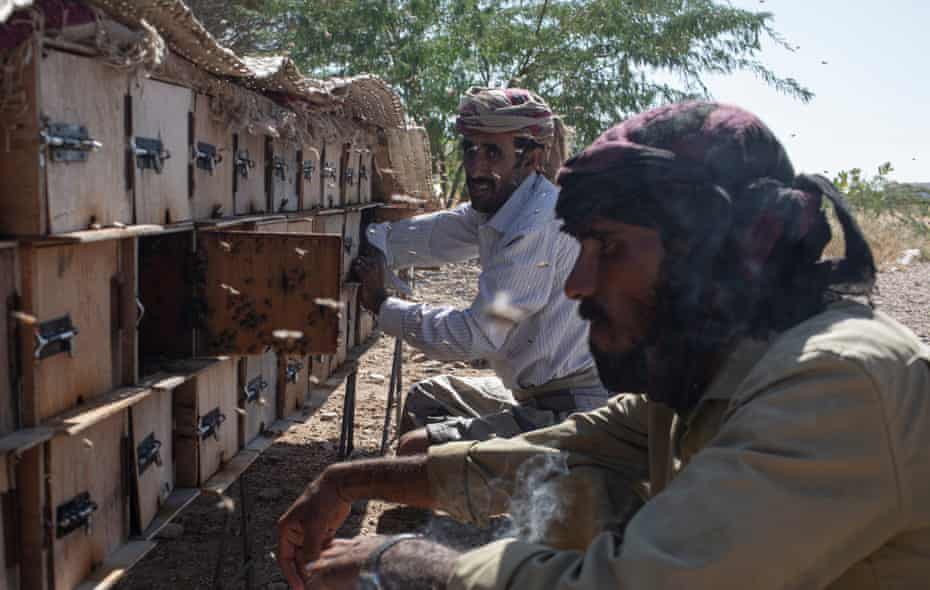
Beekeepers collect honey comb from hives just outside Ataq, Shabwah governorate, Yemen. Photograph: Sam Tarling/Sana'a Centre
Despite the dangers, more Yemenis are turning to the sector as an alternative means of income
by Bethan McKernan in Ataq
Tue 23 Mar 2021
According to the Qur’an a lone sidr tree, or jujube, marks the highest boundary of heaven. On earth, amid the harshness of the Yemeni desert, the sweetness of sidr honey is cherished as a symbol of perseverance.
Yemen has long been renowned for producing some of the best honey in the world, often compared to Mānuka honey from New Zealand. Some of the highest quality, and purest, comes from bees fed exclusively on the flowers of the sidr, producing a pale coloured honey with a fiery, almost bitter aftertaste.
While the war has made travel difficult, closing off many roads, for traditional beekeepers life is much the same: they are some of the only people in Yemen who can traverse frontlines with ease, moving around every few months in search of flowers for their bees.
Tue 23 Mar 2021
According to the Qur’an a lone sidr tree, or jujube, marks the highest boundary of heaven. On earth, amid the harshness of the Yemeni desert, the sweetness of sidr honey is cherished as a symbol of perseverance.
Yemen has long been renowned for producing some of the best honey in the world, often compared to Mānuka honey from New Zealand. Some of the highest quality, and purest, comes from bees fed exclusively on the flowers of the sidr, producing a pale coloured honey with a fiery, almost bitter aftertaste.
While the war has made travel difficult, closing off many roads, for traditional beekeepers life is much the same: they are some of the only people in Yemen who can traverse frontlines with ease, moving around every few months in search of flowers for their bees.
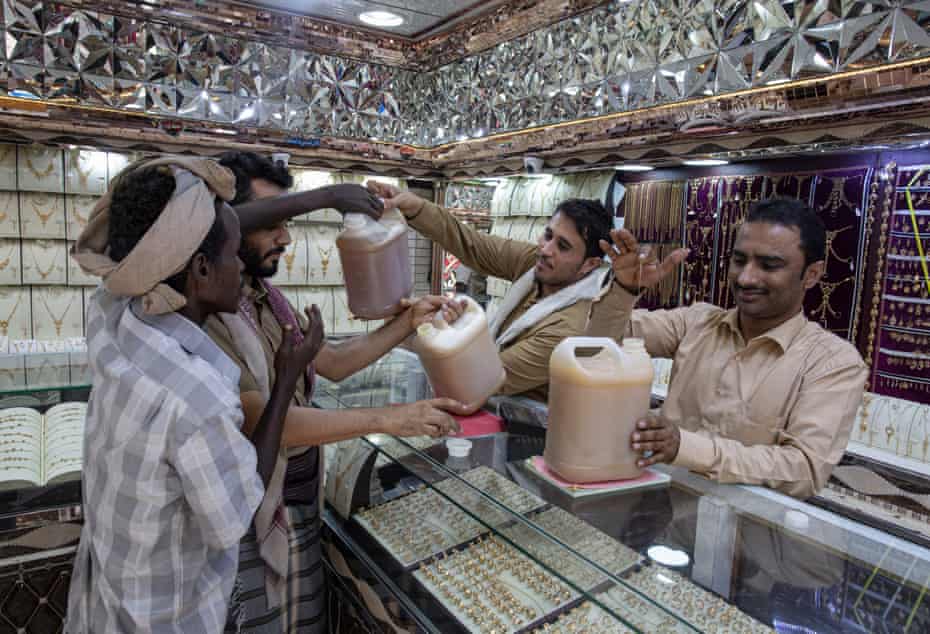
Honey sellers allow workers to sample their wares in a jewellery shop in Ataq, Shabwah governorate. Photograph: Sam Tarling/Sana'a Centre/Publication
“It doesn’t matter who is commanding a checkpoint. They see the beehives in the back of the truck and we don’t have to stop long. Even the Houthis [Yemen’s rebels] are afraid of bees,” said Said al-Aulaqi, 40, as he took a break from looking after 80 of his hives near the village of Khamer in Shabwa.
An estimated 100,000 small-scale beekeepers like Aulaqi in Yemen produce just 1,580 tonnes of honey a year, of which 840 tonnes is exported, according to a 2020 UN report.
Sidr honey can sell for up to $500 (£370) a kilogram in neighbouring Gulf states such as Saudi Arabia and the United Arab Emirates. While honey connoisseurs maintain that the Yemeni product deserves a global market, decades of political instability have meant turbulent growth and limited outside reach.
Keen to improve food stability and bring money into the country, the government has identified honey as a key sector for expansion: beekeepers, wholesalers and exporters the Guardian met in and around Shabwa’s capital, Ataq, say they are keen to share their liquid gold with the rest of the world.
“It doesn’t matter who is commanding a checkpoint. They see the beehives in the back of the truck and we don’t have to stop long. Even the Houthis [Yemen’s rebels] are afraid of bees,” said Said al-Aulaqi, 40, as he took a break from looking after 80 of his hives near the village of Khamer in Shabwa.
An estimated 100,000 small-scale beekeepers like Aulaqi in Yemen produce just 1,580 tonnes of honey a year, of which 840 tonnes is exported, according to a 2020 UN report.
Sidr honey can sell for up to $500 (£370) a kilogram in neighbouring Gulf states such as Saudi Arabia and the United Arab Emirates. While honey connoisseurs maintain that the Yemeni product deserves a global market, decades of political instability have meant turbulent growth and limited outside reach.
Keen to improve food stability and bring money into the country, the government has identified honey as a key sector for expansion: beekeepers, wholesalers and exporters the Guardian met in and around Shabwa’s capital, Ataq, say they are keen to share their liquid gold with the rest of the world.
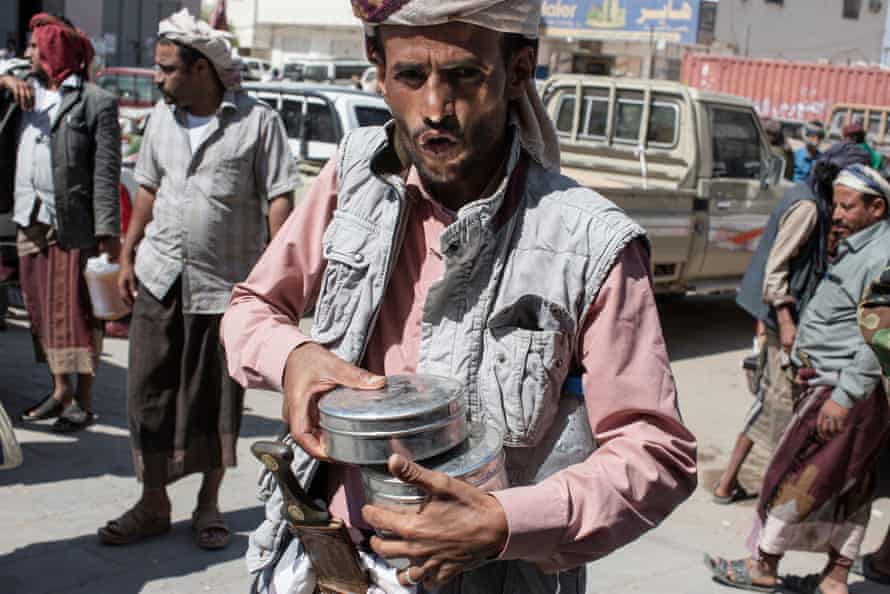
A beekeeper sells tins of honeycomb in the market area of Ataq, in Shabwah governorate. Photograph: Sam Tarling/Sana'a Centre
Aulaqi and his three young employees enthusiastically show off their wooden rectangular hives, opening the doors to display the rows of combs inside. Smoke from burning strips of hemp cloth keeps the bees drowsy and stops them stinging, although all four say they are immune after being attacked so many times.
The 40-year-old has been keeping bees for 10 years, after learning the trade from his uncle. He lost his entire livelihood in 2015, after the Houthis moved into Shabwa and blocked the road to neighbouring Abyan, where his bees died after running out of water.
Aulaqi and his three young employees enthusiastically show off their wooden rectangular hives, opening the doors to display the rows of combs inside. Smoke from burning strips of hemp cloth keeps the bees drowsy and stops them stinging, although all four say they are immune after being attacked so many times.
The 40-year-old has been keeping bees for 10 years, after learning the trade from his uncle. He lost his entire livelihood in 2015, after the Houthis moved into Shabwa and blocked the road to neighbouring Abyan, where his bees died after running out of water.
It took two years to restart with another 300 boxes purchased at a cost of 2m Yemeni riyal (£1,850). Now his hives are scattered around Shabwa’s mountains, desert and coastal plain, depending on the season.
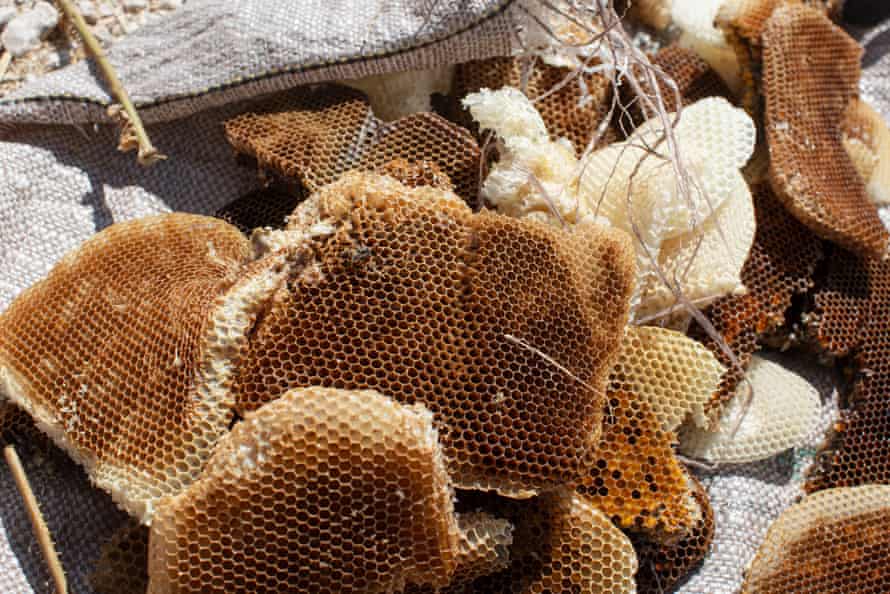
Honeycomb that has just been taken from hives, outside Ataq. Photograph: Sam Tarling/Sana'a Centre
The prized Sidr honey can only be harvested once every 12 months, but lower-grade acacia and desert flowers provide work year-round.
A generation ago, beehives were still cultivated in empty tree trunks and transported on the backs of camels; now, imported machine-made hives and pickup trucks make the work easier, even if beekeepers, like so many others in Yemen, are plagued by fuel shortages.
While there is money to be made in honey, there are also many challenges for beekeepers to overcome. If roadblocks or fighting make it impossible to move hives to more bountiful areas, the bees will die, and the insects are also at risk from unregulated pesticide use by farmers.
The prized Sidr honey can only be harvested once every 12 months, but lower-grade acacia and desert flowers provide work year-round.
A generation ago, beehives were still cultivated in empty tree trunks and transported on the backs of camels; now, imported machine-made hives and pickup trucks make the work easier, even if beekeepers, like so many others in Yemen, are plagued by fuel shortages.
While there is money to be made in honey, there are also many challenges for beekeepers to overcome. If roadblocks or fighting make it impossible to move hives to more bountiful areas, the bees will die, and the insects are also at risk from unregulated pesticide use by farmers.
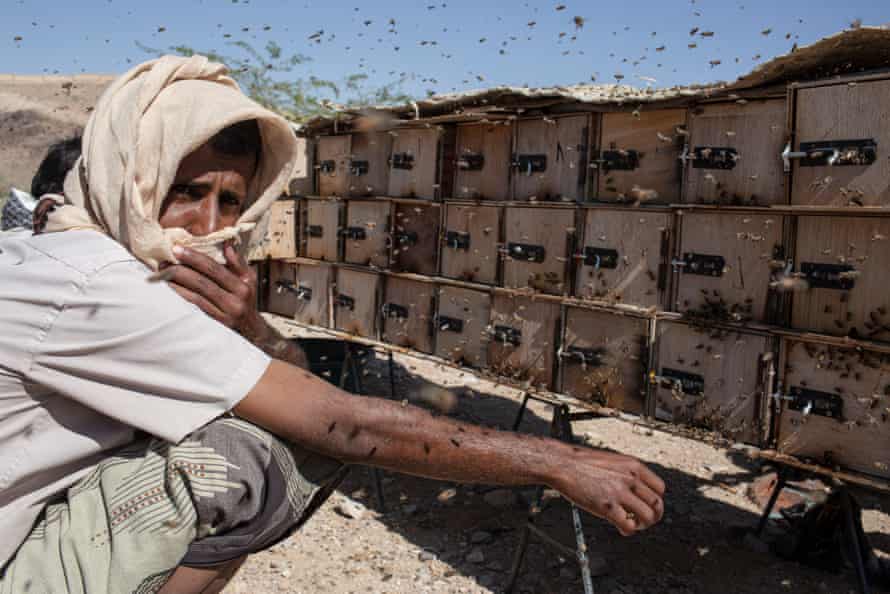
Adel Saleh Saber, 28, collects honeycomb from hives just outside Ataq. Photograph: Sam Tarling/Sana'a Centre
The war means beekeeping has become a hazardous occupation for humans too. Unmarked landmines are planted all over the country. And while keepers prefer to move bees at night, when the insects are sleepy, nocturnal movement is often viewed as suspicious by Yemen’s warring parties, and tracked closely from the air by Saudi and US drones.
Mohammed bin Lashar, a wholesaler in Ataq, said one of his suppliers was targeted by an airstrike in Maʼrib governorate. “He was lucky to survive. They probably thought he was al-Qaida,” he said.
Despite the dangers, and as inflation soars and steady work dries up, in Shabwa at least it appears more and more people are turning to beekeeping as an alternative means of income.
While more experienced keepers are happy to share what they know about the trade with newcomers, they are also worried that too many insects in the same area will make it difficult to find adequate food and water for the growing bee population, driving down standards and prices.
The war means beekeeping has become a hazardous occupation for humans too. Unmarked landmines are planted all over the country. And while keepers prefer to move bees at night, when the insects are sleepy, nocturnal movement is often viewed as suspicious by Yemen’s warring parties, and tracked closely from the air by Saudi and US drones.
Mohammed bin Lashar, a wholesaler in Ataq, said one of his suppliers was targeted by an airstrike in Maʼrib governorate. “He was lucky to survive. They probably thought he was al-Qaida,” he said.
Despite the dangers, and as inflation soars and steady work dries up, in Shabwa at least it appears more and more people are turning to beekeeping as an alternative means of income.
While more experienced keepers are happy to share what they know about the trade with newcomers, they are also worried that too many insects in the same area will make it difficult to find adequate food and water for the growing bee population, driving down standards and prices.
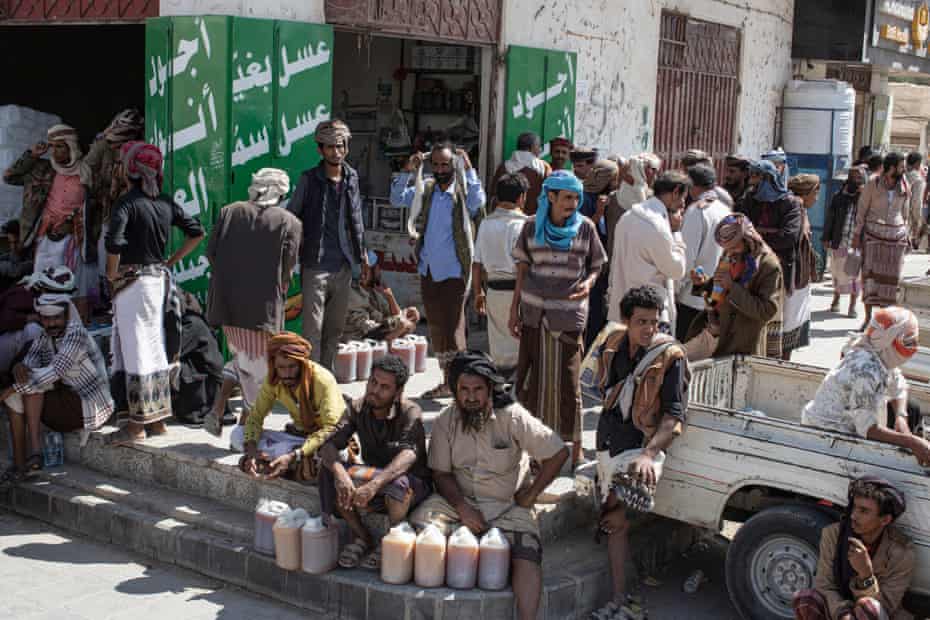
The honey market of Ataq in Shabwah, Yemen. Photograph: Sam Tarling/Sana'a Centre
In Ataq’s main square, dozens of beekeepers hawked their wares to individual shoppers and wholesalers, but few people were buying.
“This is my first season as a beekeeper,” said Saleh Al-Hansi, 25. “I like it, I enjoy the work. Other beekeepers encouraged me to start so I’ll have to see how it goes.”
There could be enough work for everyone if the authorities or local charities step in to help by planting more sidr trees, a move local beekeepers are lobbying for. Other necessary steps for expanding the sector include creating a standards agency and food safety certification system to allow Yemeni beekeepers to export their organic product throughout the world.
Aulaqi, proud of his work, would not give up his bees for anything. “It can be lonely sometimes; I only get to see my family once a month. But I used to do construction work in Saudi Arabia and it’s much better than that.
“Bees and honey are a blessing from God,” he said. “There is a lot to be thankful for.”
In Ataq’s main square, dozens of beekeepers hawked their wares to individual shoppers and wholesalers, but few people were buying.
“This is my first season as a beekeeper,” said Saleh Al-Hansi, 25. “I like it, I enjoy the work. Other beekeepers encouraged me to start so I’ll have to see how it goes.”
There could be enough work for everyone if the authorities or local charities step in to help by planting more sidr trees, a move local beekeepers are lobbying for. Other necessary steps for expanding the sector include creating a standards agency and food safety certification system to allow Yemeni beekeepers to export their organic product throughout the world.
Aulaqi, proud of his work, would not give up his bees for anything. “It can be lonely sometimes; I only get to see my family once a month. But I used to do construction work in Saudi Arabia and it’s much better than that.
“Bees and honey are a blessing from God,” he said. “There is a lot to be thankful for.”
No comments:
Post a Comment